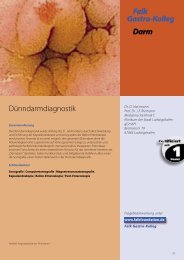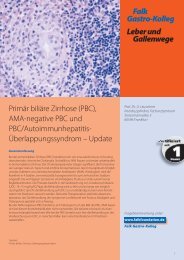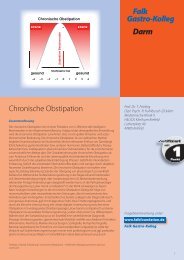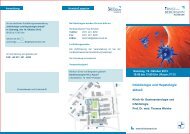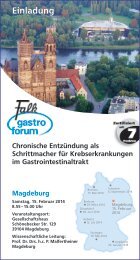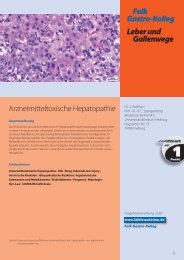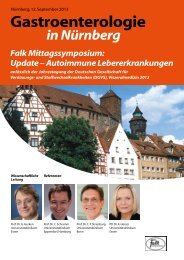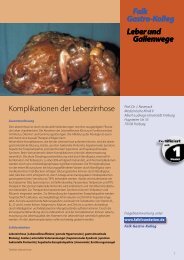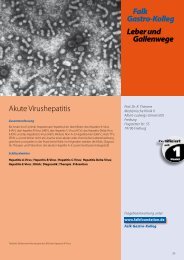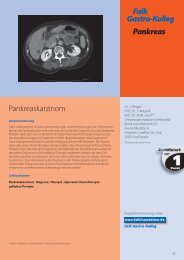152 153 Intestinal Disease Meeting Berlin 2006 - Dr. Falk Pharma ...
152 153 Intestinal Disease Meeting Berlin 2006 - Dr. Falk Pharma ...
152 153 Intestinal Disease Meeting Berlin 2006 - Dr. Falk Pharma ...
Create successful ePaper yourself
Turn your PDF publications into a flip-book with our unique Google optimized e-Paper software.
Fig. 13<br />
Diagnosis: Crohn’s disease<br />
• Characteristic pattern of inflammation<br />
Esophagus, stomach,<br />
duodenum 3–5 %<br />
Small bowel 25–30 %<br />
Small and large bowel 40–55 %<br />
Rectum 11–26 %<br />
I Endoscopy in IBD – Crohn’s disease (F. Hartmann, Frankfurt)<br />
40–55% of patients (figure 13), while rectal<br />
involvement is seen in 11–26% of patients.<br />
Thanks to endoscopy, a reliable differential diagnosis<br />
is possible in most cases and IBD can be<br />
distinguished from infectious enteritis, drug-induced<br />
enterocolitis, mesenteric ischemia, diverticulitis<br />
and malignant disease.<br />
This does not, however, represent the limits of<br />
endoscopy. “We cannot only inspect the mucosa,<br />
but also obtain biopsies,” F. Hartmann said. In<br />
his opinion, the strength of endoscopy lies in its<br />
capacity to monitor the disease course, especially<br />
with regard to the possible development of dysplasias.<br />
He was more guarded in his assessment<br />
of the new developments in endoscopy, noting<br />
that “I do not believe that we need capsule endoscopy<br />
to reliably diagnose Crohn’s disease.”<br />
Congress Short Report <strong>Falk</strong> Symposium <strong>152</strong><br />
P.N. Meier<br />
Special care is required in children<br />
Special conditions apply to pediatrics, P.N. Meier<br />
(Hannover) explained. One must always consider<br />
the special situation of children who, while they<br />
may not directly fear the endoscopic procedure,<br />
are more prone to anxiety at being separated<br />
from their parents. There are also some practical<br />
issues involved, such as the fact that children are<br />
not able to remain abstinent from food for long<br />
periods. “They should always be examined early<br />
in the morning,” P.N. Meier noted. Wherever<br />
possible, the procedure should be conducted<br />
under general anesthesia. With the exception of<br />
newborns and young children, P.N. Meier said,<br />
special endoscopy units are not required. Good<br />
cooperation between the pediatrician and the<br />
consulting gastroenterologist is essential.<br />
15



